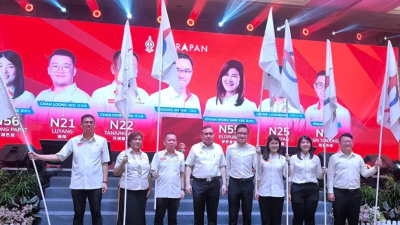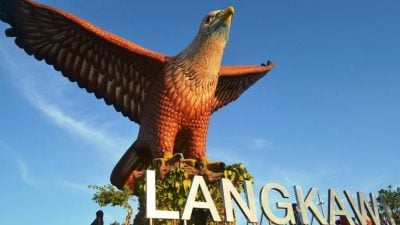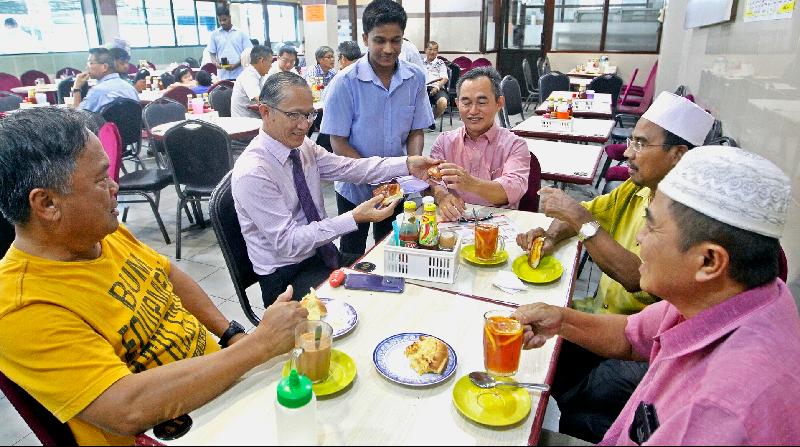
Tough but right decision
Gabriel Lim is a second generation Chinese Malaysian in Brunei. His father Lim Chai Huat is the founder of the Bandar Seri Begawan's most famous Chinese restaurant Phongmun Restaurant Sdn Bhd.
Gabriel Lim said his father came to Brunei from Batu Pahat, Johor in the 1980s, initially to earn some money before going back to Malaysia.
However, he slowly got used to life in Brunei and later had his own business and property there. He then decided to settle down in the oil-rich sultanate.
Gabriel was born in Malaysia before the entire family moved to Brunei. He is still holding a Malaysian passport today.
He told Sin Chew Daily he furthered his studies in Singapore after finishing lower secondary school in Brunei. He later married in Singapore and lived there for ten years before making up his mind to return to Brunei.
"I came back mostly because my parents were old and as the only son, I had the responsibility to come back here to take care of them."
He said he decided to come back to Brunei only about four or five years ago.
"Back then I was doing well in Singapore and my wife had her own job, family and friends there.
"She had to give up all this to become a housewife in Brunei. So, it was a really tough decision for me to make."
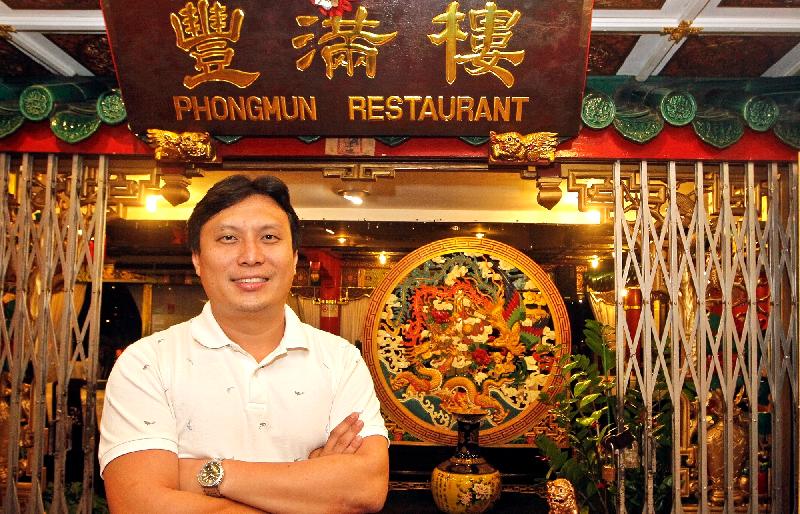
Today, Gabriel is happy to have made the decision to come back to Brunei, where life is relatively slow and relaxed compared to Malaysia or Singapore. "It is a perfect country for family living.
"Life is not that hectic in Brunei. I can have more time with my kids. I want them to grow up in the same environment I grew up."
Although Brunei is a Muslim-majority country, English is quite important in the country's education policy.
"Brunei's education system is quite similar to the GCE (General Certificate of Education) where English is the teaching medium, while Malay and Chinese are also taught.
"This is where the government's education policy has done very well."
Due to the relatively affluent society, crime rate is extremely low in Brunei.
"It is totally safe here. You don't have to worry about leaving your door wide open at night. You also won't feel threatened walking alone at night.
"This is where the government has done really well!"
Coming to Brunei by chance

Originally from Melaka, Gan Bee Yoon, a teacher at Chung Hwa School Tutong, has been living in Brunei for 35 years and is now a Brunei citizen.
"I came to Brunei by chance actually." She told Sin Chew Daily her father saw a recruitment advertisement on the newspaper for a teacher at Chung Hwa School Labi in Brunei, and told her to apply for it.
"I was already working in KL at that time and wasn't very much interested in the Brunei job. However, I did not want to disappoint my father. I sent an application letter and was successful."
Upon arriving here, she found that the place was totally different from what she had imagined. She said the school was actually in a rural area about an hour's drive from the city, not to mention the poor road condition into the city.
"I was like going from a big city to a village smaller than my own hometown. Initially I didn't get used to it and gave myself two years to adapt. If I couldn't adapt to the new environment, I would go back to Malaysia after two years."
Gan later met her future husband, a Brunei citizen.
"I came to know him through a Kuching friend whom I came to know through a radio program."
They married in 1989 and after five years, she became qualified to apply for Brunei citizenship.
However, she did not apply initially because she still wanted to retain her Malaysian citizenship.
"Due to some personal reasons, I decided to apply for Brunei citizenship and give up my Malaysian citizenship in 2007.
Very difficult test
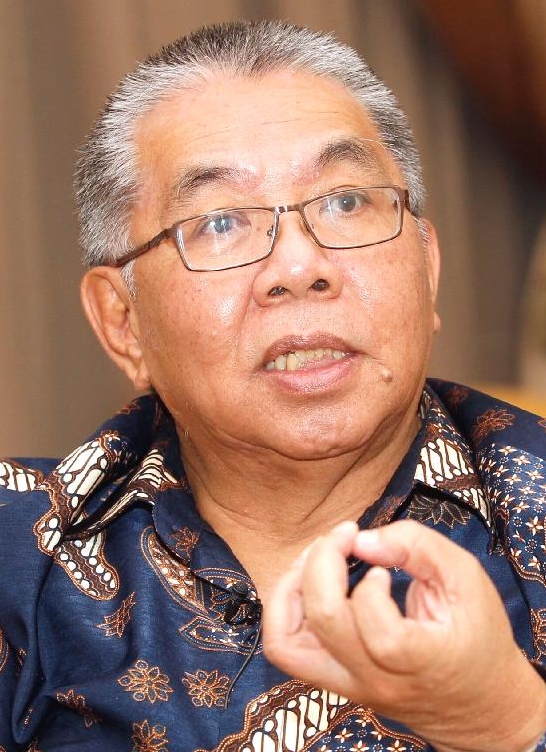
Koo Kong Loi, managing director of Juswin Enterprise, is a well known local community figure in Belait-Seria area. He has served at Belait Shell Company for more than 42 years.
Koo has since the 1980s been actively taking part in activities organized by government as well as private civic associations.
Koo's father came to work in a Brunei oil field from Miri, Sarawak in the 1940s.
Although Koo was born in Brunei, he will need to pass stringent Malay language and customs test in order to get a "yellow card".
"The test is very difficult and I have failed four times. I have now decided to give up!"
As he is only a Brunei permanent resident holding a "red card", he will need special visa each time he wants to travel out of the country.
Koo admitted that there was indeed preferential treatment for the local indigenous people in the 1980s but the policy was later liberalized in the 90s.
"To the Chinese people, there isn't any difference now working in a Bruneian company. As long as you meet the requirements, and are prepared to work hard, you will get the chance.
"Today, even if you are a foreigner, you will still be accepted if you are a professional."
Good education system
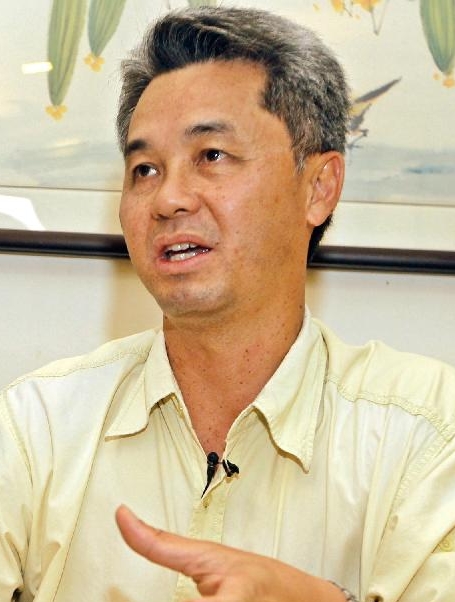
Lai Hong Yoon was heavily indebted after his business failed in 2010, and decided to come to Brunei for work given the favorable exchange rate here.
"It was RM2.30 to the Bruneian dollar at that time," he said.
Born in Negeri Sembilan and growing up in KL, Lai was later sent to Kuching due to work, where he later settled down and got married.
He said he maintained a close relationship with the Malays when he was living in West Malaysia, and as such he found not much cultural shock coming to Brunei.
He said initially he came to Brunei alone while his wife and kid stayed back in Kuching.
"Later my child had to go to a kindergarten, I did some survey and found that the education system in Brunei was not bad, so I decided to bring my wife and child here."
Currently Lai's child is studying at a private school in Brunei. Even though English is the teaching medium, Chinese is also taught at the school.
"I always insist that my child learn his mother tongue and understand his culture."
"Although most of the people around us are Muslims, my child has no problem playing with other kids. Religious issues are seldom brought up. Generally speaking, Brunei enjoys very high degree of racial harmony, unlike in Malaysia."
As Brunei is a monarchy, there are no political parties taking part in politics. As such, racial issues are seldom raised.
"Bruneians are generally very accommodating. They can readily accept outsiders."
Lai is currently living in Brunei on a work permit as "green card" holder. He admitted that if he eventually failed to get permanent residence here, he would have no choice but to leave Brunei, adding that it was very difficult to get a PR here.
Although there is no differential treatment for foreigners, they will inevitably be at a disadvantage.
"I don't have the so-called retirement protection. I need to plan everything myself. My permit needs to be renewed every two years pending my health conditions."
He said getting his work permit renewed would become a challenge as his age catches up.
"Having lived here for more than ten years, I would say overall Brunei is better than Malaysia. It is safe here. Life is simple and it is a very nice place to have a family.
"Strict alcohol ban is a good thing for the people's health. This is obviously better than Malaysia.
"I have actually thought of staying here permanently due to geographical and cultural proximity, but in the long run, I still need to make some future preparations, such as sending my child overseas for studies."
ADVERTISEMENT
ADVERTISEMENT







